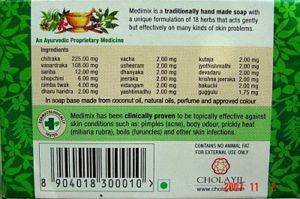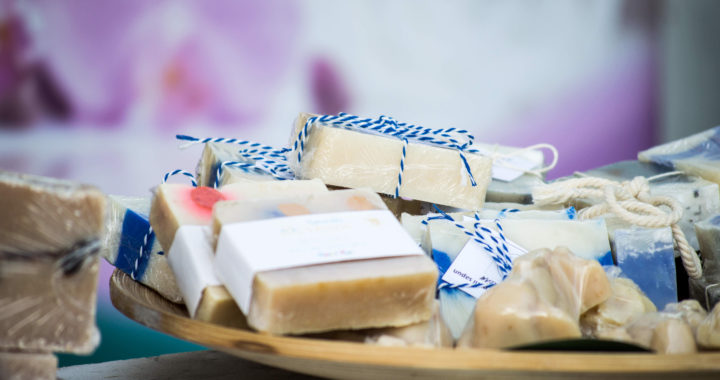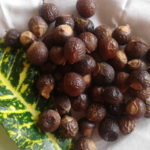Traditional bathing Soaps are eco-friendly products, which are fast being replaced by chemical based Shower Gels & Body Washes.
Soaps have been around for a millennia. Or atleast, since the day a guy found that his chances of getting a date increased if he used soap & water in the morning. So unless you are a college student, you will agree that soaps are an integral part of daily living!
But with our predilection for messing things up, we have taken a simple product like soap, and replaced it with shower gels – a total chemical concoction, harmful for health, and damaging for the environment. Let us try and understand what goes inside a shower gel and why is it harmful.
All about Shower Gels
Globally, as well as in urban India, Shower Gels are fast replacing Soaps as the preferred medium for body cleansing. In fact, in “developed” countries like the US, it is almost impossible to find bathing soap in supermarkets. Instead, all you get is rows and rows of shower gels.
So what are the common ingredients used in Shower Gels/Body Washes?
Yes! This is the chemical concoction that we slather on our bodies every day!
Studies have shown that a number of these ingredients can have harmful effects for health. The David Suzuki foundation has listed the health concerns associated with a number of these commonly used ingredients.
Many of these ingredients/chemicals, are actually made from petroleum byproducts and have been found to act as hormone disruptors. Now, I am definitely not in favor of getting my hormones disrupted !
Our hormones are responsible for physical growth, activation of immune system, regulation of metabolism, control of reproductive cycle, maintaining sugar, salt & water balance, mood swings, absorption of nutrients etc. and a myriad of other functions. Having said that we should also know that only a small amount of these hormones is capable of making profound changes physically. So, even small disruptions to our hormonal balance can create distinct disease patterns and play havoc within our bodies!
To add to it, Shower Gels come in all sorts of alluring plastic packaging, which again is bad for our environment because it ultimately adds to the already rapidly accumulating non-degradable trash on the Earth.
Microbeads in shower Gels
But , that’s not the end of the list! As if all these chemical and their damaging effects was not enough. Trust corporations used their human “ingenuity” to make an already icky product even more disastrous for the environment! How ? By adding plastic pellets, also known as micro-beads in them to increase their scrubbing or exfoliating action. A large number of shower gels, hand washes, scrubs & even toothpastes now come with these microbeads.
These plastic microbeads because of their small size are easily carried away to lakes, rivers & even oceans. A large number of aquatic animals around the world have been found to have these plastic pellets inside them, causing their slow poisoning. Not only do microbeads add to our plastic waste, eventually they also end up in human bodies, as people eat the fish and other marine organisms, which have been ingesting these synthetic & toxic plastic beads.
Origin of Soaps
In comparison, our beloved traditional soaps are a much more eco-friendly alternative as compared to Shower Gels. Soaps are made of commonly available, mostly natural ingredients. In fact, throughout most of history, soaps were made by hand.
Soaps were the preferred cleaning agents in the Pre-Petroleum Age, and have been around for more than a millennia. Soaps are made from commonly available Fats or Oils including Coconut Oil, Olive oil, Palm Oil etc. In fact, Palmolive soap was so named, as it was made from a combination of Palm & Olive oils. Soaps are produced when the fatty acids available in oils or fats, are combined with an alkaline base. In ancient times, soaps were made by mixing plant oils or animal fats with wood ash.
For a long time now, my family’s favourite soap has been the  classic Medimix soap, one of the most popular ‘Ayurvedic’ soaps around. Medimix has 60% coconut oil as its base, and is enriched with 18 other Ayurvedic herbs, useful for the skin. While it is commonly used as a daily soap, it is also useful in many skin conditions. There is another way in which Medimix is eco-friendly, as their South Indian plants make hand-made products only. Thus, minimal electricity is used in manufacturing Medimix soaps!
classic Medimix soap, one of the most popular ‘Ayurvedic’ soaps around. Medimix has 60% coconut oil as its base, and is enriched with 18 other Ayurvedic herbs, useful for the skin. While it is commonly used as a daily soap, it is also useful in many skin conditions. There is another way in which Medimix is eco-friendly, as their South Indian plants make hand-made products only. Thus, minimal electricity is used in manufacturing Medimix soaps!
Dangers of Triclosan
While buying soaps, one should keep in mind that these days a number of Soaps contain the ingredient ‘Triclosan’. Among other concerns, Triclosan is known to disrupt the functioning of the thyroid hormone, interfere with reproductive systems and increase antibiotic resistance in bacteria. One of the uses of Triclosan is as a pesticide.
Triclosan has become ubiquitous in products like soaps, hand washes, toothpastes, mouth washes, etc. But owing to the increasing awareness about the health concerns related to it, consumer giants in the west are in the process of phasing it out. However its usage is continually increasing in cosmetic products in India. So its highly recommended to check out the list of ingredients, for presence of Triclosan, before buying any personal care product.
Bathing Powders
An even more nature-friendly method than Soaps for bathing is to use Bathing Powders, made with Gram Flour (Besan, Chickpea flour), or Green Gram Flour (Hari Moong) as the base ingredient. For example, Sunni Pindi is a traditional bathing powder used in the southern states of India.
Sunni Pindi can be made at home also, using commonly available herbs & powdered grains. Ayurvedic Bath Powders made using a variety of special herbs, are also available commercially. We now have natural products like Luxury Bath Powder and Multani Mitti
from Ancient Living, and bathing powders from Aswini and Prithvi.
Thus, there is no reason to depend on shower gels/body washes, as a number of natural ready-to-use solutions are available for personal care, which are skin friendly, while being benign for the Earth.









